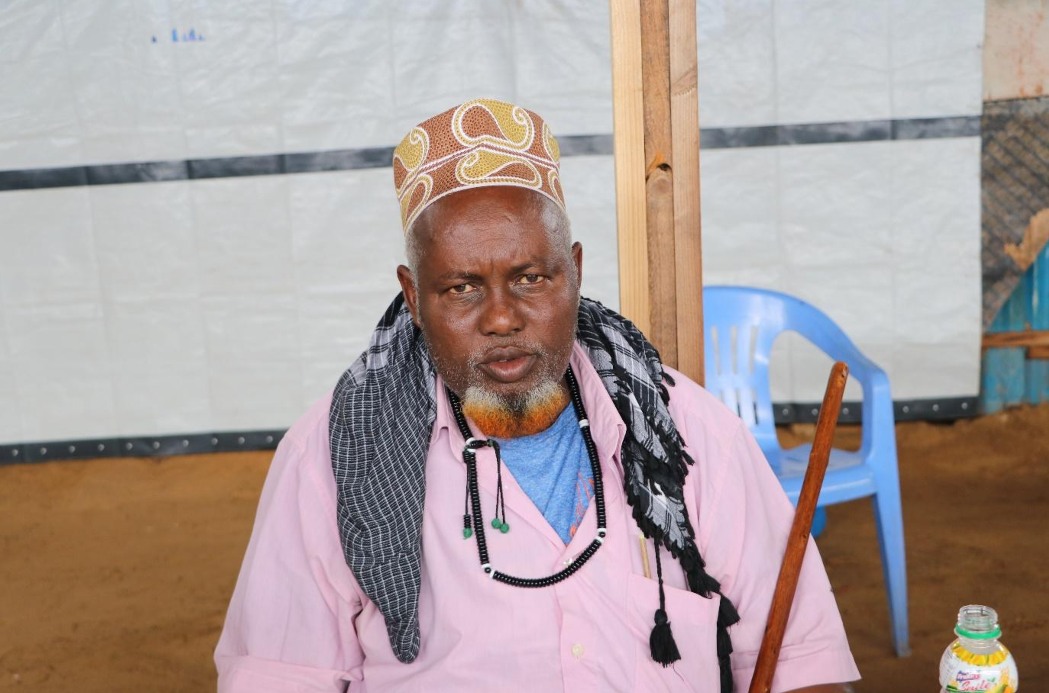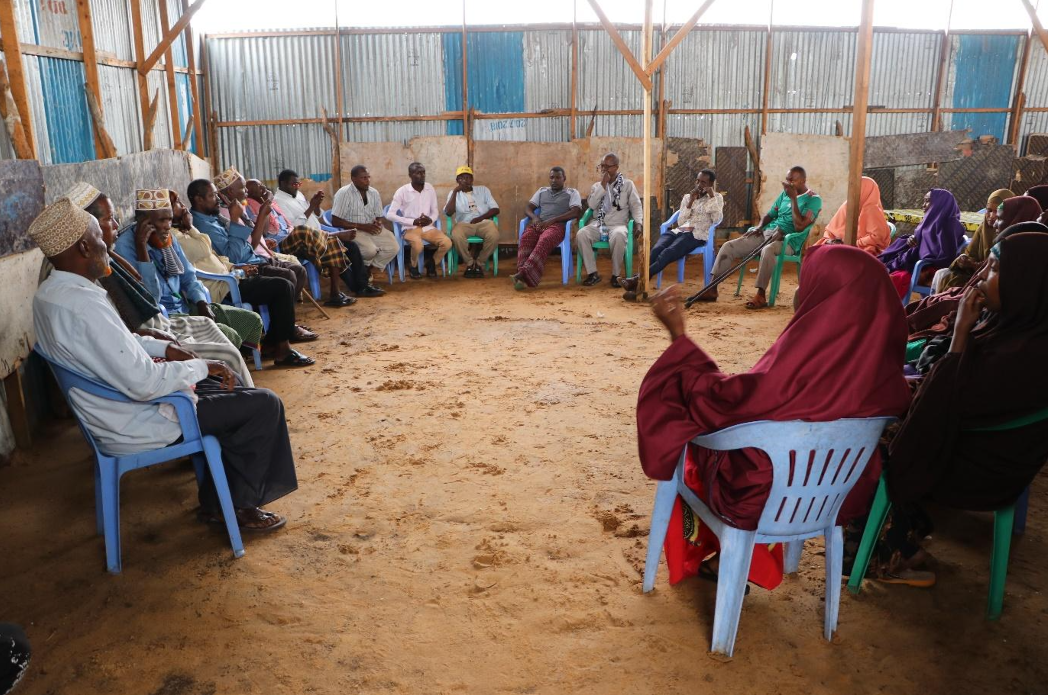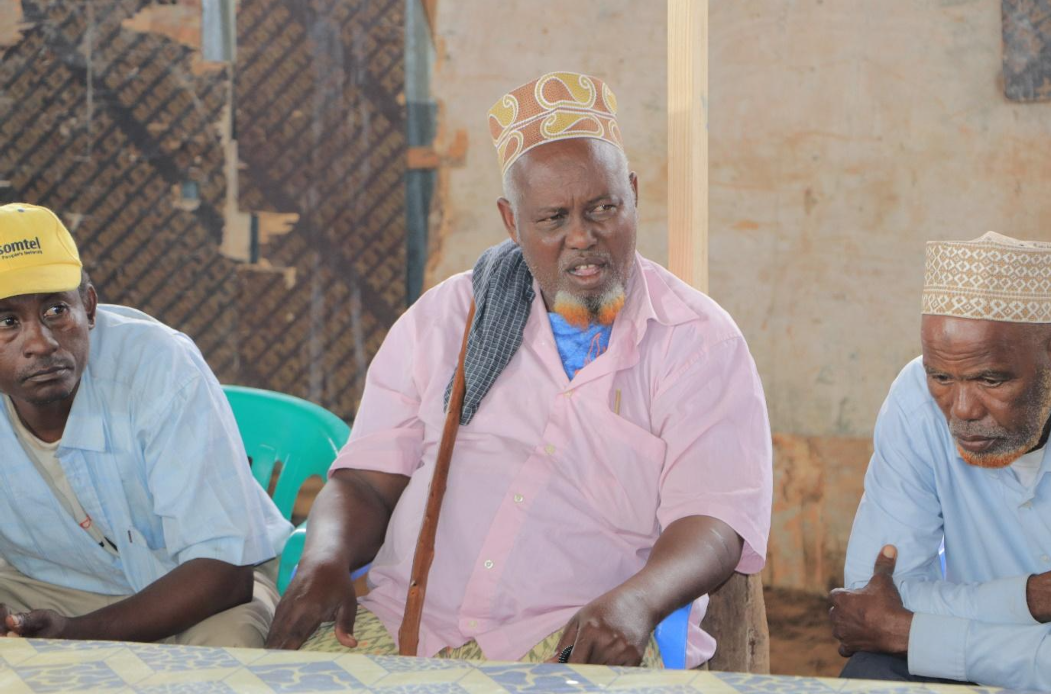HLP project is aimed at helping vulnerable drought-affected populations in Mogadishu and Baidoa protecting them from Housing, Land and Property (HLP) violations and empowering them to claim and enjoy their HLP rights.

HOUSING IS NOT EVERYTHING BUT WITHOUT IT THERE IS NO LIFE
54-year-old Farah Ali was desperate, hungry and hopeless as he fled from Qoryooley in the lower Shabelle region with his family a few months ago. The father of seven was an agro-pastoralist but lost everything he had to the devastating drought.
“When the river dried because of the drought, I lost my crops and the animals,” said Farah.
“We have decided to move to the IDP camps in Mogadishu. We had nothing left- no animals, crops or even money. It was time to save our lives,” added Farah.
After trekking for days, Farah and his family arrived at Samadeeq IDP Centre in the Kahda area on the outskirts of Mogadishu.
“We had nothing to eat, so we had to rely on neighbours we found at the IDP camp for food handouts,” said Farah.
“Unlike in Qoryooley, where I relied on my farm and animals, life was difficult here at the IDP camp. I had to look for work which is not an easy thing to get since I had no skills,” said Farah
However, Farah’s family joined other IDPs that NRC has registered to offer them support. After a few weeks, Farah and his wife were accommodated and each given 60 dollars which they used to buy food and other basic needs.

Gradually, the family began adapting to new life. However, they had no legally registered land of their own- a common challenge all the newly arrived IDPs face in major cities as the drought worsens.
Thousands of pastoralists and farmers have been forced into makeshift IDP camps across the country as the drought worsens. Aid agencies are reporting that 90% of Somalia’s population has been affected by the drought- the worst in 40 years.
In addition to the impact of the drought, thousands more have been internally displaced by prolonged insecurity such as clan conflicts and military offensive happening in lower Shabelle region.
At the IDP camp, Farah was lucky to have been invited to a community-led forum to discuss land dispute challenges and how to prevent them. The forum, organized by NRC was aimed at supporting community structures that would help strengthen their capacity for local dispute resolution through Community-led land dispute dialogues and forums. He was one of 30 IDPs selected from across the IDP camps in the area.
“I have learnt a lot from the forum. As IDPs, we have been advised not to cause problems with neighbours and land owners. We have been told not to litter the area with waste and ensure we maintain cleanliness at all times,” said Farah.
Farah is also aware that being an IDP is a temporary situation.

“I see a bright future for my family. One day, I may own my land, educate my children and live like the rest of the people,” added Farah.
The NRC’s Housing land and Property Rights Project (HLP) is aimed at helping IDPs learn about their rights and live in dignity.
“We try to educate them about their rights regarding owning property such as land. In most cases, the IDPs are vulnerable and need support,” said NRC’s Abdimahad Sheikh Ibrahim, Housing land and Property Rights Project assistant in Mogadishu.
“We have identified boundary conflicts between neighbours, boundary conflicts between clans, group invasion of private land as some of the challenges IDPs face during drought”, added Ibrahim.
To succeed in the HLP project, NRC has adopted a strategy to work with local communities in the IDP camps.
“We have established a structure through which we provide material and technical support to the IDPs. This helps increase their capacity to deal with many disputes around home, land and property,” said Ibrahim, the project assistant.
The forum discussed causes of land dispute at the IDP camps which include a land dispute amongst the IDP, a dispute involving the community and also one involving land owners. Together, the participants agreed to avoid anything can cause a dispute.
On the other hand the forum emphasizes dispute resolution techniques, especially in areas where the IDPs are arriving in large numbers.
The HLP project is aimed at helping vulnerable drought-affected populations in Mogadishu and Baidoa protecting them from Housing, Land and Property (HLP) violations and empowering them to claim and enjoy their HLP rights.
